The Demarcation of Sword and Sorcery
by Joseph A. McCullough V
(Originally published at SwordAndSorcery.org)
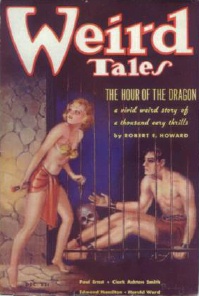 The term “Sword and Sorcery” first entered into popular language with the release of the 1982 film, Conan the Barbarian. Since then, it has been sporadically and haphazardly applied to any story that happened to have both sword fighting and magic. In the last few years, sword and sorcery has even cropped up in a few reviews of The Lord of the Rings (1), but unfortunately this is one of the works that the term was invented to exclude. Despite this repeated misuse by people who do not know any better, and occasional misuse by people who should, a significant distinction can be made between Heroic Fantasy (the term that should be used by those who wish to group Conan and The Lord of the Rings together) and sword and sorcery. To prove and define this distinction, it is necessary to take a look at the origin of both terms and to establish the definitive works that fall into each category.
The term “Sword and Sorcery” first entered into popular language with the release of the 1982 film, Conan the Barbarian. Since then, it has been sporadically and haphazardly applied to any story that happened to have both sword fighting and magic. In the last few years, sword and sorcery has even cropped up in a few reviews of The Lord of the Rings (1), but unfortunately this is one of the works that the term was invented to exclude. Despite this repeated misuse by people who do not know any better, and occasional misuse by people who should, a significant distinction can be made between Heroic Fantasy (the term that should be used by those who wish to group Conan and The Lord of the Rings together) and sword and sorcery. To prove and define this distinction, it is necessary to take a look at the origin of both terms and to establish the definitive works that fall into each category.
The origins can be traced to the middle of the twentieth century, when Lin Carter and L. Sprague de Camp became the first authors to attempt book-length discussions of the new popular fiction genre called “fantasy,” and they are owed a great deal of credit for being the first to try to define, explain, and codify this new type of writing. (2) As part of their explorations they coined a new term, Heroic Fantasy, to discuss a specific group of fantasy stories. Later, John Flynn defined heroic fantasy thus:
The term heroic fantasy . . . refers to a sub-genre of fantastic literature which chronicles the tales of heroes and their conquests in imaginary lands. Heroic fantasy emphasizes the conflict between good and evil, and often casts a reluctant protagonist (human or hobbit) in the role of champion. Though he may not always be saintly, the hero’s strength, wit, and resourcefulness help him triumph over evil forces. The background for that struggle is almost always an exotic one [ . . .]the settings are sometimes as important as their mythopoetic narratives. Often confused with sword and sorcery, weird fantasy, science fiction or historical romance, heroic fantasy is as old as the first stories told (and written down) about heroes and their legendary deeds. (3)
Carter and de Camp were less focused on establishing an exactly worded definition for the genre than they were interested in bringing together the authors who defined heroic fantasy through their works. They mention briefly the historical works that could qualify as heroic fantasy; the works of Homer, the Epic of Gilgamesh, Beowulf, and the Icelandic Sagas, but they concentrate on the works of the twentieth century. From a large number of contributors, Carter and de Camp, along with later critics, have established the works of two men as being truly representative of heroic fantasy.
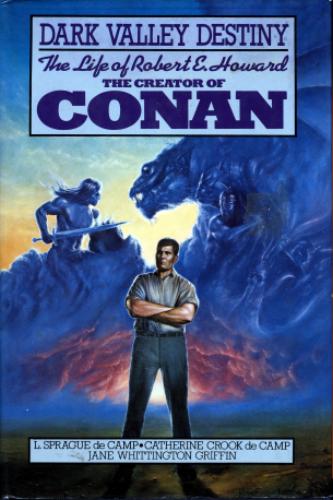 The first is Robert Ervin Howard. Born in Texas in 1906, Howard became one of the most popular authors writing for the much-maligned pulp magazines. These magazines, which achieved massive popularity between the two world wars, focused on quick, action-oriented stories. Although Howard wrote for a variety of pulps, including western and boxing pulps, he is best remembered for his fantasy, nearly all of which first appeared in the pulp magazine Weird Tales. His creations include the dour puritan wanderer, Solomon Kane; Bran Mak Morn, the last King of the Picts; and most famous of all, Conan the barbarian.
The first is Robert Ervin Howard. Born in Texas in 1906, Howard became one of the most popular authors writing for the much-maligned pulp magazines. These magazines, which achieved massive popularity between the two world wars, focused on quick, action-oriented stories. Although Howard wrote for a variety of pulps, including western and boxing pulps, he is best remembered for his fantasy, nearly all of which first appeared in the pulp magazine Weird Tales. His creations include the dour puritan wanderer, Solomon Kane; Bran Mak Morn, the last King of the Picts; and most famous of all, Conan the barbarian.
In the introduction to Dark Valley Destiny, a biography of Howard written by L. Sprague de Camp, Catherine Cook de Camp, and Jane Whittington Griffin, Catherine states “We know even less about the boy who grew up to create, almost single-handedly the subgenre of American fiction that is now called ‘Heroic Fantasy'” (4). This is perhaps an overstatement, but it does emphasize the importance that many people place on Howard’s writing when discussing the subgenre. L. Sprague de Camp said, “Next to J.R.R. Tolkien, the most widely-read and influential author of heroic fantasy is Robert E. Howard creator of Conan” (5).
J.R.R. Tolkien is the second (at least chronologically) of the definitive writers of heroic fantasy. Sometimes called “The father of modern fantasy,” no discussion of heroic fantasy can go far without mentioning Tolkien or his massively influential work, The Lord of the Rings. Establishing these two authors as definitive of the genre will become crucial in the later discussions of the differences between heroic fantasy and sword and sorcery.
Despite the debt owed them for their work promoting the genre, Carter and de Camp have also managed to create quite a bit of confusion. Partly this is due to their occasionally suspect research, mostly by de Camp (6), but also because both men had the tendency to use the terms “heroic fantasy” and “sword and sorcery” interchangeably. Even in the face of large quantities of evidence to the contrary, which will be examined in a moment, this mistaken use of terminology still appears in writing today.
One man who never confused the two terms was the famous writer Fritz Leiber. Best known today as one of the “Grand Masters” (7) of science fiction, he is also beloved for his creation of Fafhrd and the Grey Mouser, a pair of swashbuckling fantasy adventurers. Although the numerous stories of Fafhrd and the Grey Mouser are undoubtedly heroic fantasy (8), Leiber once wrote:
It strikes me (and something might be made of this) that Fafhrd and the Grey Mouser are at the opposite extreme from the heroes of Tolkien. My stuff is at least as equally fantastic as his, but it is an earthier sort of fantasy. . . (9).
It is impossible to say that he was specifically thinking of the term heroic fantasy when he wrote this, but it is clear that he was discontent with his fantasy stories being placed in the same category as The Lord of the Rings. Because of this, in 1961, Fritz Leiber coined the term “Sword and Sorcery” to refer to his own type of fantasy. Thus, because the term was created specifically for the stories of Fafhrd and the Grey Mouser, these tales belong unquestionably to the genre.
Despite creating the term to fit his own writing, Fritz Leiber certainly thought other writing fell within the confines of sword and sorcery. In fact, at one point, Leiber would go so far as to declare, “The best pulp Sword and Sorcery writer was Robert E. Howard” (10). At first glance, this statement would seem to undermine the entire argument for the distinction between the genres, for how different can they be if the works of one author are definitive to both?
To this there are two answers. The first is that heroic fantasy is a much broader term that includes sword and sorcery. Thus while J.R.R. Tolkien defines one end of heroic fantasy, Robert E. Howard defines the other. The two exist on the same genre spectrum, as it were, but still remain far removed from one another and distinct. Somewhere in the middle of the spectrum where heroic fantasy and sword and sorcery meet, the two subgenres get hopelessly muddled to the point that a specific work cannot be clearly identified, but this is a problem with any attempt at defining genre and does not invalidate of the value of the definition. Perhaps the best evidence for the distinction can be found when it is noted “J.R.R. Tolkien once remarked that he enjoyed Howard’s Conan stories despite the fact that they differed greatly in theme and temperament from his own writings” (11). Thus we come full circle: Leiber pairs himself with Howard and distances himself from Tolkien. Tolkien returns the favor by distancing himself from Howard, and yet they are all definitely heroic fantasy as defined by Carter and de Camp.
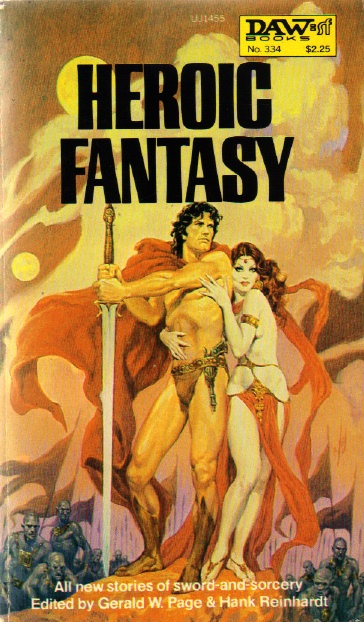 Now to return to the question of Howard being a definitive writer in both genres, there is a second and probably more important argument to be made. Although best known for creating Conan the Barbarian, Howard is well known in fantasy circles for creating four major fantasy character cycles of which Conan was the last. Many critics, when talking about sword and sorcery, have pinned the birth of the genre down to a specific Howard story, “The Shadow Kingdom” (12). This story, published in Weird Tales in 1929, thus becomes critical, not just for what it includes, but also for the stories that preceded it and have been excluded from the definition of sword and sorcery. “The Shadow Kingdom” is the first of a group of stories about King Kull, but before this story saw print, Robert E. Howard had already written and completed two story cycles about the characters Solomon Kane and Bran Mak Morn. These two characters are a part of the heroic fantasy tradition as codified by Carter and de Camp, but have been left out of the more exclusive camp of sword and sorcery. This distinction that exists within Robert E. Howard’s own writing becomes of tremendous importance when trying to ascertain the differences between the two genres.
Now to return to the question of Howard being a definitive writer in both genres, there is a second and probably more important argument to be made. Although best known for creating Conan the Barbarian, Howard is well known in fantasy circles for creating four major fantasy character cycles of which Conan was the last. Many critics, when talking about sword and sorcery, have pinned the birth of the genre down to a specific Howard story, “The Shadow Kingdom” (12). This story, published in Weird Tales in 1929, thus becomes critical, not just for what it includes, but also for the stories that preceded it and have been excluded from the definition of sword and sorcery. “The Shadow Kingdom” is the first of a group of stories about King Kull, but before this story saw print, Robert E. Howard had already written and completed two story cycles about the characters Solomon Kane and Bran Mak Morn. These two characters are a part of the heroic fantasy tradition as codified by Carter and de Camp, but have been left out of the more exclusive camp of sword and sorcery. This distinction that exists within Robert E. Howard’s own writing becomes of tremendous importance when trying to ascertain the differences between the two genres.
So, although it is clear that many of the critics and most of the authors agree that there is a distinction between heroic fantasy and the more exclusive sword and sorcery, it still remains to be shown where this distinction lies. This distinction can be made clear by a careful comparison of the definitive works of the two genres with Tolkien’s The Lord of the Rings and Howard’s Solomon Kane and Bran Mak Morn representing heroic fantasy, and Leiber’s Fafhrd and the Grey Mouser and Howard’s Kull and Conan representing sword and sorcery. This comparison reveals glaring differences in two key areas: character and scope.
The characters of heroic fantasy take full advantage of the ambiguity of the word “hero” and can vary as greatly as Sir Galahad does from Mordred. It is partially this ambiguity that allows sword and sorcery to exist within the scope of heroic fantasy, despite the fact that its characters universally share three traits that separate them from the majority of the great fantasy heroes. They are all self-motivated, outsiders, of heroic stature.
To start with the last first, because it is the most obvious and the least revealing of the nature of sword and sorcery, it is readily apparent that all the heroes are men of action. (Until recently there were few heroic women, but this is a trait of all heroic fantasy, and thus beyond the scope of this essay). Of the four characters cited to represent sword and sorcery, three, Conan, Kull, and Fafhrd, are muscular barbarians whose strength dwarfs the normal men with whom they come in contact. The fourth, the Grey Mouser, is small in stature, but an expert swordsman and deadly quick. Contrast this with two of the protagonists of The Lord of the Rings, Frodo Baggins and Sam Gamgee. Frodo and Sam, being members of a small humanoid race called hobbits, are both physically weak and, at least at the beginning of the book, have never held a weapon in anger. The Lord of the Rings is also peopled with great warriors, but the fact that it can have hobbits as heroes clearly demonstrates a fundamental difference in the thinking behind the two genres.
The second distinction is found in the concept of the outsider. As mentioned before, three of the representatives of sword and sorcery are barbarians, which by definition places them outside of society. The Grey Mouser, though not a barbarian, was also raised in an isolated environment. Perhaps the most interesting outsider of this group and one who deserves extra attention is Kull, or, as he is sometimes called, King Kull. Kull was born on Atlantis, mythically the greatest civilization the world has ever known. But instead of being part of that society, Kull was abandoned as a child and, in the great heroic tradition, raised by wolves. Thus through Kull, Howard created the greatest distance between his character and human society that could be conceived of in the world in which Kull operated. This idea of the outsider allowed Howard to write about society through the eyes of an unbiased character. It might seem curious and contradictory then that Kull goes on to seize the crown of Valusia, the greatest empire in the world (Atlantis had by this time fallen into the sea). In actuality, this just gave Kull/Howard a better view to explore society through the outsider. In only one of the Kull stories does the idea of society versus the outsider play a major role. In, “By this Axe, I Rule!” King Kull is torn between doing what his conscience tells him is right and what the ancient laws of his empire demand. At the end of the story, Kull takes his axe and smashes the stone tablets that contain the ancient laws of the empire, thus rather graphically reasserting his outsider values over the laws of society.
In contrast to these outsiders, many of the characters of heroic fantasy are enmeshed within their societies. The hobbits Frodo and Sam are wonderful examples of the simple hobbit life, which mostly involves gardening, eating, and playing. In fact, when the gathering of heroes known as “The Fellowship of the Ring” is formed in The Lord of the Rings, several of the members are part of the group specifically because they are representative of the society from which they come. One of these heroes, Aragorn, stands as a great contrast to Kull. When Aragorn is first met, he is introduced as a ranger, a kind of wild woodsman, seemingly an outsider much like the sword and sorcery barbarians. But as the story later reveals, Aragorn is actually the true king of Gondor, the greatest nation of men. So, although Aragorn begins the tale an outsider, by the end of the book, he has fully embraced society. Another example of a different way in which the outsider/insider argument can play out in this context is by examining Robert E. Howard’s first heroic fantasy character, Solomon Kane. Kane is a puritan in Elizabethan times who wanders Europe and Africa fighting evil. Although he is an outsider in the specific setting of most of his stories, he is not an outsider to most of his readership, who come from the same Judeo-Christian philosophy and western culture that he does. So the concept of the outsider is critical to sword and sorcery in that the protagonist isn’t bound by the same social conventions or morals that the readership is used to from their own societies.
This concept helps to provide an explanation of the third and perhaps most important trait that separates the protagonists of sword and sorcery from the rest of their heroic fiction cousins. Unbound by any societal sense of right and wrong (at least as most would recognize it) these men are free to chart their own destiny, and their motivations and actions are purely self-defined. Thus when Leiber writes about his heroes, he says, “they drink, they feast, they wench, they brawl, they steal, they gamble, and surely they hire out their swords to powers that are only a shade better, if that, than the villains.” (13). In short, Fafhrd and the Grey Mouser are motivated by their lust for life and lust for adventure. Conan, the giant who casts his shadow over all the other characters of sword and sorcery, puts it thus: “Let me live deep while I live; let me know the rich juices of red meat and the sting of wine on my palate, the hot embrace of white arms, and the mad exultation of battle when the blue blades flame crimson, and I am content” (14). This has prompted some critics to say that the protagonists of sword and sorcery are in fact “anti-heroes,” which if the term is just taken to mean “a self-motivated protagonist” is probably true. However, to be self-motivated does not necessarily mean to be driven by the baser instincts. In fact the last of the definitive sword and sorcery heroes, Kull, rarely seems to take much pleasure in any of the pleasures of the flesh. Instead, as strange as it may seem, the barbarian king is continually searching for meaning to the universe. Though he may be a king, his stories almost never involve his people: only in the above-mentioned “By this Axe, I Rule” does he take any notice of those he rules; instead, he wanders on his own existentialist journey (15). Kull is as completely self-motivated as the others, just not in such a blatant, anti-social way.
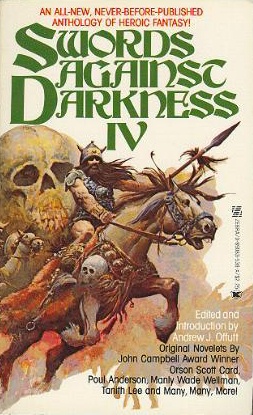 The contrast then, between these heroes and many who populate heroic fantasy is readily evident. The Lord of the Rings is filled with reluctant adventurers. Frodo by virtue of being a more or less average hobbit is almost the antitheses of a sword and sorcery hero. He loves the simple things and would prefer to live his life in peace. But destiny conspires to deny him this option and literally puts the fate of the world in his hands. He must leave his home and his way of life, not because of any personal desire, but because only he can save the world. In the same story, Aragorn takes the crown of Gondor, not out of a sense of personal achievement or a lust for power, but because only by doing so can he save the race of man. Perhaps the feelings many of the heroes of The Lord of the Rings can be summed up in the words of the human warrior Faramir:
The contrast then, between these heroes and many who populate heroic fantasy is readily evident. The Lord of the Rings is filled with reluctant adventurers. Frodo by virtue of being a more or less average hobbit is almost the antitheses of a sword and sorcery hero. He loves the simple things and would prefer to live his life in peace. But destiny conspires to deny him this option and literally puts the fate of the world in his hands. He must leave his home and his way of life, not because of any personal desire, but because only he can save the world. In the same story, Aragorn takes the crown of Gondor, not out of a sense of personal achievement or a lust for power, but because only by doing so can he save the race of man. Perhaps the feelings many of the heroes of The Lord of the Rings can be summed up in the words of the human warrior Faramir:
War must be, while we defend our lives against a destroyer who would devour all; but I do not love the bright sword for its sharpness, nor the arrow for its swiftness, nor the warrior for his glory. I love only that which they defend (16).
By putting this quotation next to the one from Conan above, the distinction of self-motivated versus self-sacrificing becomes clear.
To prove the point further, this difference can be seen within the works of Robert E. Howard by contrasting Kull and Conan with Howard’s other two fantasy characters. Bran Mak Morn spends the entirety of his short story cycle fighting a hopeless battle on behalf of his people, the Picts. He never expresses any love for what he does, but possesses the knowledge that he is the only hope that remains for an ancient race. Solomon Kane is on the surface more like Conan in that he is a wanderer who seems to enjoy battle and adventure, but “Solomon Kane is the religious man, the man of faith. His abiding concern is not with the temporal world, but with the advancement of the human spirit.” (17) (This is an advancement he wants for everyone, not just himself). Thus, his true motivating factor is a faith in God.
This idea of God leads right into the second major difference between sword and sorcery and the rest of heroic fantasy, the idea of scope or scale. Part of this is the obvious difference between the preferred method of story telling for the two genres. Sword and sorcery is most commonly found in short stories, often linked by a continuing character, but with little other connection between the tales. In the rest of heroic fantasy, Tolkien made the trilogy the common form, and many modern heroic fantasy writers are taking it even further, writing five, and even ten, book sets. This longer narrative allows authors to use much more complicated plot lines, bring in more characters, and have those characters journey all over the world. This idea is not definitive though, as examples exist to disprove both sides, and it is a concept driven as much by market forces as artistic ones.
Instead the definitive aspect of the idea of scope or scale lies in the idea that something exists that is bigger and stronger than the heroes. This can be God, gods, fate, destiny, good and evil, law and chaos. But these must be more than mere concepts. They must be tangible driving forces at work in the world.
So, to return to Solomon Kane, we find a character who is guided by God, and who acts as His agent on earth. And this is more than a concept that exists in the mind of the hero; often in the course of his adventures, Kane’s faith becomes an actual force allowing him to defeat immaterial monsters or creatures that can only be overcome by those possessing the faith of the one true God. A similar, if opposite, idea is at work in the stories of Bran Mak Morn. Despite Bran’s heroic stature as a near-perfect warrior, there are forces at work in his world much larger and more powerful than him. In his story, “Worms of the Earth,” Bran sells his soul to the material embodiment of evil in order to have his revenge. Such a thing was foretold in the stories, for all the stories of Bran are overhung by a powerful doom, an inescapable fate.
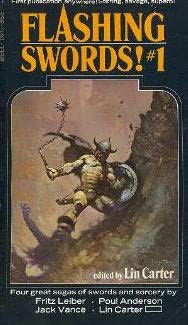 This concept of the higher power is even more prevalent in The Lord of the Rings. This tale is infused with the concepts of fate and destiny. Ancient prophecies are fulfilled and new prophecies are spoken and come to pass. At one point, Aragorn stands atop the castle walls, looking out at an enemy army, and says they should go or by morning they shall all be killed. At the time he spoke, it was almost a laughable thing to say, but come morning it is proved true (18). Time and time again, the idea that there is a higher purpose being played out intrudes upon the narrative.
This concept of the higher power is even more prevalent in The Lord of the Rings. This tale is infused with the concepts of fate and destiny. Ancient prophecies are fulfilled and new prophecies are spoken and come to pass. At one point, Aragorn stands atop the castle walls, looking out at an enemy army, and says they should go or by morning they shall all be killed. At the time he spoke, it was almost a laughable thing to say, but come morning it is proved true (18). Time and time again, the idea that there is a higher purpose being played out intrudes upon the narrative.
The higher powers are represented by more than just unseen forces. Though the actual gods of Middle-Earth (the land of The Lord of the Rings) are distant and remote and only occasionally referred to, their direct servants (beings equitable with angels) walk the earth in physical form. This is true of both the central antagonist, Sauron, and one of the heroes, Gandalf. Although the exact purpose and motivations of these characters are not always clear, it is apparent that they are attempting to implement the will of their gods. At one point in the story, Gandalf is killed with his mission unfulfilled, and is resurrected and sent back by the higher powers. (19)
The contrast between the above ideas and those presented in sword and sorcery could not be further apart. In the stories of Fafhrd and the Grey Mouser, the gods of Lankhmar, and the gods in Lankhmar (20) are most often the butt of jokes and usually exist only as background scenery. The one time the gods of Lankhmar appear in a story, they are chased off by an army of rats, leaving Fafhrd and the Grey Mouser to save the city–not out of any feeling of obligation, but because they have a score to settle (21). Kull, despite his search for meaning to the universe, never gives any consideration to God, and in the course of his adventures never encounters anything that can’t be solved by his intelligence or more often his axe. Of the great sword and sorcery heroes, only Conan has any kind of respect for higher authority. In one story he says he believes in a god named Crom, but that there is no point in ever calling upon the god, for the most he is every likely to grant a worshiper is a quick death (22). In another story, Conan admits that he believes in the gods, but that he “would not stand in their shadow” (23). So although some higher powers seems to exist in the world of Conan, that power is irrelevant to human existence in general and more importantly to the actions of the hero.
So there can be little argument that a great deal of separation exists between sword and sorcery and the rest of heroic fantasy when discussing the scope of the narratives. Combine this idea with the obvious gap between the protagonists that populate the genres and a clear distinction begins to develop. Sword and sorcery tells the tales of men who are free from all constraint. Their stature and skill mean they are free from the tyranny of other men. Their birth and raising free them from the morals and mores of society, and the lack of higher powers unbinds them from any concept of fate. Thus the heroes of sword and sorcery become the true representatives of free-will, and through their stories, readers are able to imagine the capabilities and the triumphs of men who are completely free to chart their own destiny. This is likely why sword and sorcery throughout the years has often appealed to a teenage crowd, who feel they are suffering from the pointless tyranny of the elders; while the rest of heroic fantasy, with its duties and obligations, has historically appealed to an older audience who are aware of the realities of such notions. Which is not to say that even old Oxford professors don’t occasionally like to escape from the world of demands into the freedom embodied by Conan the barbarian.
23 thoughts on “The Demarcation of Sword and Sorcery”